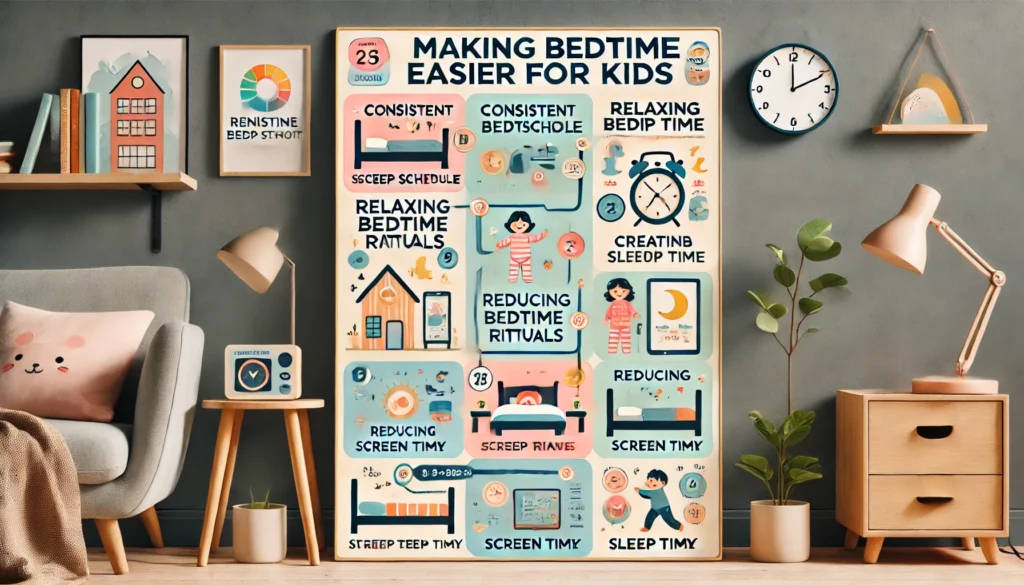
How to Make Bedtime Easier for Your Kids
Getting kids to bed can often feel like an uphill battle. However, creating a consistent bedtime routine is essential for their physical health, emotional stability, and overall well-being. By understanding how sleep impacts children and adopting proven strategies, parents can make bedtime smoother and less stressful. Therefore, this article explores practical tips to establish an effective sleep routine, reduce bedtime resistance, and promote healthy sleep habits.

The Importance of Sleep for Children
Why Quality Sleep Matters
Sleep is essential for children’s growth and development. During sleep, their bodies release growth hormones, repair tissues, and strengthen their immune systems. Furthermore, sleep supports memory consolidation and emotional regulation. When children get adequate rest, they perform better in school, have improved mood stability, and display better behavior.
The Consequences of Sleep Deprivation
Insufficient sleep can significantly impact children’s mental and physical health. For instance, sleep-deprived kids may become irritable, anxious, or hyperactive. Moreover, chronic sleep deprivation can weaken the immune system and impair cognitive functioning. Therefore, establishing a consistent and soothing bedtime routine is crucial.
Creating a Consistent Bedtime Routine
Setting a Regular Sleep Schedule
Children thrive on routine. Therefore, putting them to bed and waking them up at the same time every day regulates their internal clock. Consistency reinforces their natural sleep-wake cycle, making it easier for them to fall asleep and wake up refreshed.
Establishing Pre-bedtime Rituals
Introducing calming pre-sleeping rituals helps children associate specific activities with sleep. For example, reading a story, listening to soothing music, or practicing deep breathing can create a sense of relaxation. As a result, these predictable routines signal that it is time to wind down.
Creating a Calm Sleep Environment
A comfortable and soothing sleep environment significantly impacts sleep quality. Therefore, dim the lights, reduce noise, and maintain a cool room temperature. Additionally, soft, breathable bedding and a favorite stuffed animal can provide extra comfort, promoting better sleep.
Reducing Bedtime Resistance
Managing Separation Anxiety Bedtime
Separation anxiety is common in young children. To ease their distress, offer reassurance by spending a few minutes with them before they fall asleep. For instance, a gentle hug or a reassuring phrase can help them feel safe and secure.
Avoiding Overstimulation Before Bedtime
Exciting activities before going bed can make it harder for children to settle down. Therefore, limit screen time at least an hour before bed, as blue light interferes with melatonin production. Instead, encourage quiet, screen-free activities like drawing or reading.
Using Positive Reinforcement
Praising children for good bedtime behavior encourages consistency. For instance, create a reward system with stickers or small treats for successfully following their sleeping routine. Consequently, positive reinforcement motivates them to stick to healthy sleep habits.
Helping Kids Wind Down
Gentle Stretching or Yoga
Light stretching or child-friendly yoga poses can help relax children’s muscles. For example, simple poses like child’s pose or cat-cow stretch promote relaxation and reduce tension, making it easier for them to drift off to sleep.
Guided Relaxation or Meditation for Bedtime
Using guided meditation apps or playing gentle relaxation music can calm children’s minds. Moreover, soothing audio programs with nature sounds or going bed stories promote relaxation and prepare them for sleep.
Aromatherapy and Calming Scents
Lavender and chamomile scents have calming effects. Therefore, using essential oil diffusers or lightly misting their pillows with lavender spray can create a soothing atmosphere.
Nutrition and Sleep
Limiting Sugary Snacks Before Bedtime
Sugary snacks and caffeine-laden drinks can cause hyperactivity, making it difficult for children to fall asleep. Therefore, offer light, sleep-friendly snacks, such as bananas or warm milk, which contain sleep-promoting nutrients like magnesium and tryptophan.
Staying Hydrated Without Overdrinking
While hydration is important, excessive fluids before bedtime can lead to frequent bathroom trips. Thus, encourage children to drink water earlier in the evening to prevent sleep disruptions.
Managing Nighttime Fears
Using a Nightlight
Many children fear the dark. Installing a dim nightlight provides comfort without being too bright. Therefore, choose a warm, soft glow to create a sense of security.
Offering a Comfort Object
A favorite stuffed animal or blanket can provide emotional security. Therefore, these familiar objects offer reassurance and help children feel safe while sleeping.
Using Gentle Reassurance
When children wake up due to nightmares, offering gentle reassurance is essential. Therefore, speak calmly, hold their hand, and remind them they are safe. Over time, this consistency reduces nighttime fears.

Adapting Strategies by Age
Sleep Tips for Toddlers (1-3 years) Bedtime
Toddlers need 11-14 hours of sleep, including naps. Therefore, establishing a calming routine with consistent nap and bedtime schedules promotes better nighttime sleep. Additionally, avoid overstimulation close to bedtime.
Sleep Tips for Preschoolers (3-5 years) for Bedtime
Preschoolers need 10-13 hours of sleep. Therefore, creating a predictable bedtime routine, such as bath time followed by a story, reinforces healthy sleep habits. Moreover, limiting screen time in the evening is particularly important for this age group.
Sleep Tips for School-aged Children (6-12 years) for Bedtime
School-aged kids need 9-12 hours of sleep. Encourage relaxation techniques, such as deep breathing or gentle stretching, to help them unwind. Additionally, limiting homework and screen exposure before bed improves sleep quality.
Conclusion
Helping children develop healthy sleep habits is vital for their growth, development, and emotional well-being. By creating a consistent bedtime routine, managing nighttime fears, and reducing bedtime resistance, parents can make bedtime easier and more peaceful. With patience and consistency, children will enjoy better sleep and improved overall health.






